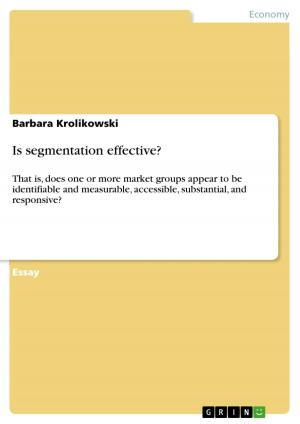Ben and Jerry's - Japan Strategic Analysis and the expansion to the Japanese market
Business & Finance, Management & Leadership, Management| Author: | Marc Gittler | ISBN: | 9783638147712 |
| Publisher: | GRIN Publishing | Publication: | October 15, 2002 |
| Imprint: | GRIN Publishing | Language: | English |
| Author: | Marc Gittler |
| ISBN: | 9783638147712 |
| Publisher: | GRIN Publishing |
| Publication: | October 15, 2002 |
| Imprint: | GRIN Publishing |
| Language: | English |
Seminar paper from the year 2002 in the subject Business economics - Business Management, Corporate Governance, grade: A, International School of Management Dortmund (San Diego, USA), course: Strategic Management, 10 entries in the bibliography, language: English, abstract: Ben and Jerry's is one of the best known super-premium ice-cream manufactures in the United States. In 1998 Ben and Jerry's expanded its business to Japan, the second largest ice cream market in the world. It was a significant step in the company's history and strategic orientation. In the beginning they had to face several problems which had to be solved before entering the market. This planning phase took from 1994 to 1996 followed by a test market phase in 1997. One of the mayor problems was to find a partner who could provide an adequate distribution network. Ben and Jerry's finally decided to enter the market with the help of Seven-Eleven Japan Co. Ltd., which is a franchise convenience store chain of about 8,000 stores in Japan. This made it possible for Ben and Jerry's to offer their ice-cream to a lot of people without building up their own distribution network. The company could also make use of the experience of Seven-Eleven who obviously can better assess the Japanese's need and habits. In 2000 Ben and Jerry's was acquired by Unilever, a multinational food and personal products company. This acquisition gives Ben and Jerry's the possibility of using the existing distribution channels and reduce the dependency on other companies. Also with Unilever as its parent company the company has a new financial strength which allows them to expand marketing strategies and research and development. Based on the following analysis Ben and Jerry's is very good positioned in the markets they are competing in. The company uses its strengths and the opportunities in order to fight against potential threats and weaknesses they face due to the lack of huge market share.
Seminar paper from the year 2002 in the subject Business economics - Business Management, Corporate Governance, grade: A, International School of Management Dortmund (San Diego, USA), course: Strategic Management, 10 entries in the bibliography, language: English, abstract: Ben and Jerry's is one of the best known super-premium ice-cream manufactures in the United States. In 1998 Ben and Jerry's expanded its business to Japan, the second largest ice cream market in the world. It was a significant step in the company's history and strategic orientation. In the beginning they had to face several problems which had to be solved before entering the market. This planning phase took from 1994 to 1996 followed by a test market phase in 1997. One of the mayor problems was to find a partner who could provide an adequate distribution network. Ben and Jerry's finally decided to enter the market with the help of Seven-Eleven Japan Co. Ltd., which is a franchise convenience store chain of about 8,000 stores in Japan. This made it possible for Ben and Jerry's to offer their ice-cream to a lot of people without building up their own distribution network. The company could also make use of the experience of Seven-Eleven who obviously can better assess the Japanese's need and habits. In 2000 Ben and Jerry's was acquired by Unilever, a multinational food and personal products company. This acquisition gives Ben and Jerry's the possibility of using the existing distribution channels and reduce the dependency on other companies. Also with Unilever as its parent company the company has a new financial strength which allows them to expand marketing strategies and research and development. Based on the following analysis Ben and Jerry's is very good positioned in the markets they are competing in. The company uses its strengths and the opportunities in order to fight against potential threats and weaknesses they face due to the lack of huge market share.















